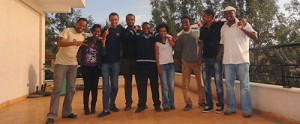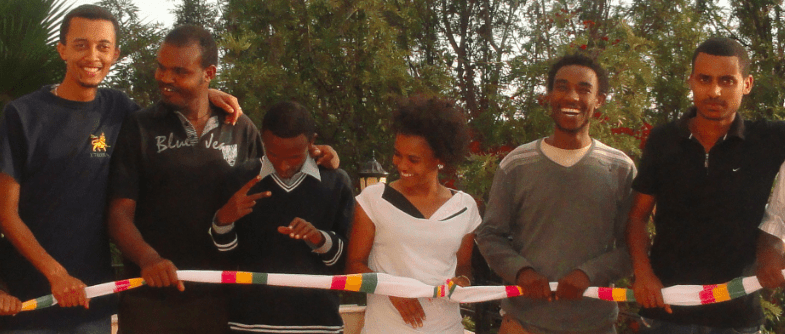Mr. A was close friends of one of the Zone 9 bloggers before six members of the group were arrested. But since July last year, when the bloggers were allowed visitors in prison, he has become a close friend to them all. The 28-year-old, referred to here as Mr. A to protect his identity, says he used to read their blogs with enthusiasm. He told me that since the arrest of the bloggers, Ethiopia’s budding online community has effectively diminished to online trolling by opposing factions.
To show solidarity for his friends and their cause, Mr. A has been attending the bloggers’ trial at Lideta High Court. The bloggers have been charged with terrorism and inciting violence using social media, to use the Ethiopian government’s parlance. Despite the heavy presence of security personnel during the trial, Mr. A has managed to attend the court proceedings alongside other supporters, friends, and family members.
Mr. A told me that for almost the entire 18 months of the trial he has not heard the judges nor the prosecutor speak with any certainty about the fate of his friends. But Mr. A says he has never lost hope that the presiding judges will clear his friends of these fabricated charges. He said he believes the judges will rule that writing dissenting opinions, telling stories, and using encryption for online communication are not criminalized in the Ethiopian constitution. But his hopes of being reunited with his friends in Zone 9–the name the bloggers use to refer to Ethiopia, and which is derived from the eight zones of Kality jail where political prisoners are held–are starting to fade as weeks became months, and months become a year. To date, four of his friends have endured 38 adjournments with no apparent progress. (In July, CPJ reported that two members of the group had been released after charges against them were dropped.)
The optimism of many friends, a few family members, and many other people who follow this case that the group will soon be released is dwindling. Throughout 2014 and early 2015, it was not uncommon to see long lines of people waiting outside the court so they could attend the trial, but lately that number has abated. Mr. A said he attributes this to the sheer number of meaningless adjournments. He said the government’s apparent strategy to exhaust the bloggers and their loved ones appears to be working, but that “we will keep the fight.”
The ongoing online campaign that uses the #FreeZone9Bloggers hashtag sparked thousands of tweets from different groups at the time of their arrest, but the volume of the tweets has been decreasing steadily. As well as drawing attention to the jailed bloggers, the hashtag helped raise awareness internationally about repression in Ethiopia.
Media organizations have continued to report on the Zone 9 bloggers, and the Committee to Protect Journalists, along with other international non-governmental organizations including Electronic Frontier Foundation, Freedom House, Article 19, and Global Voices have released statements condemning the sluggish legal process.
For Mr. A however, the trial cannot be described as a legal process anymore. He told me that labeling the trial as a legal process would be misleading because of how it is being carried out. For instance, at the last two hearings he attended, no judges were present in the main court room.
The 36th hearing on September 7 illustrates his point. Mr. A told me that family members, friends, journalists from the monthly English-language magazine Addis Standard, and a few international diplomats were sitting on benches in the court room, waiting for the three judges to arrive. Security guards escorted the bloggers into the courtroom and made them sit on a long wooden bench in front of a platform where the judges were due to sit. About 30 minutes went by, but the judges never showed up. Instead, as Mr A. was later told by the bloggers during a prison visit, an usher and a security guard led the bloggers to an office, where one of the judges was waiting. The judge told them a verdict had been reached but he could not tell the bloggers what it was because his two colleagues has not signed the verdict paper. The judge said he had to reschedule the trial for October 8, but told the bloggers if he got the signatures of his colleagues he would let them know the verdict in prison. However, the bloggers told Mr. A they have not heard anything about the decision and on October 8 they were not taken to court. They were told the hearing had been canceled because the judges were attending a short course.
Ethiopia has received huge funds from international donors for training judges and streamlining judicial processes in federal and local courts. However, in this case, it would seem that courses in expedited trials have not had an impact. Dragging out the cases of journalists, writers, and dissidents has been a defining characteristic of the Ethiopian government. A federal judge in one of the higher courts, who asked not to be named, told me it is estimated that more than 90 percent of court cases take an average of two years to complete. Referring to data he and I collected from the Ethiopian federal high court, he added that chances are high that a litigation process involving journalists or dissidents would take longer and that the majority of the time the defendants would be found guilty.
It has been three months since I reported for Global Voices that the trial of Zone 9 bloggers has reached a crucial phase: a phase in which the judges were expected either to exonerate or convict the defendants. Instead the trial has become an endless exhibition of the political power of the inner circle of the ruling party. The Ethiopian justice system is one big mess. The legal machinery set up by the late Meles Zenawi, whose spirit has become the law of the land, is allowing for the arrests, prosecutions, and exiling of journalists. The Zone 9 bloggers’ trial has become a signifier not only of Ethiopia’s shambolic justice system but its poor democratic progress.


Leave a Reply